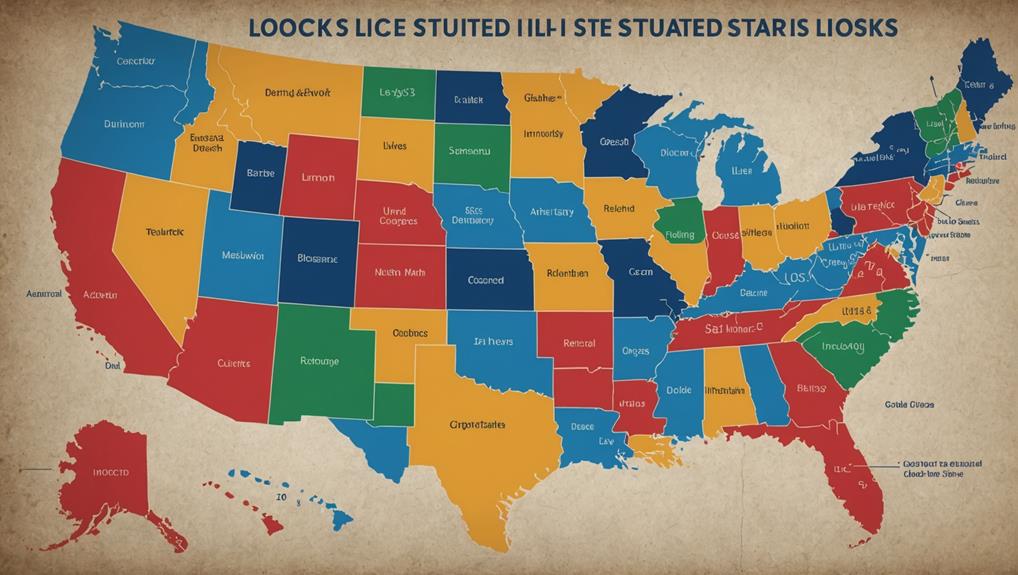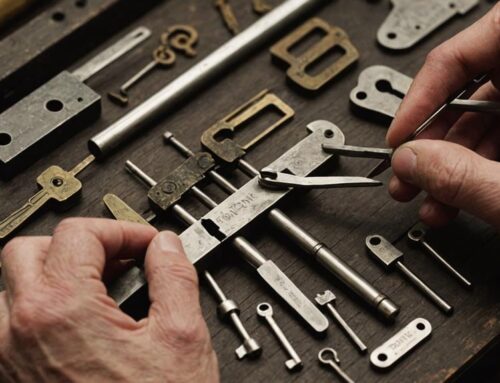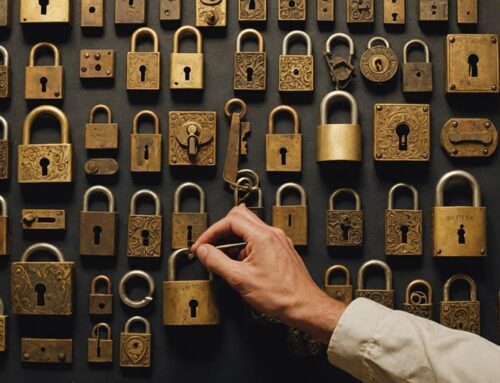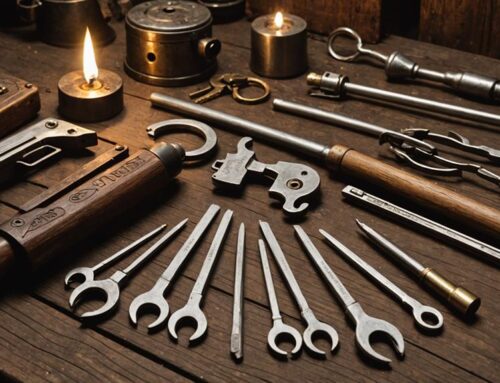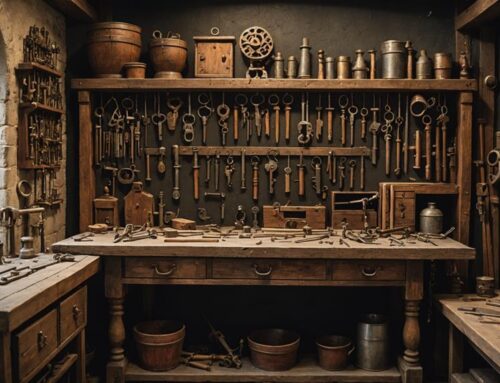To understand lock picking laws in the U.S., know that possessing lock picking tools with unlawful intent is illegal in multiple states. It's essential to only practice lock picking on locks you own or have permission to pick. Each state has specific regulations — for instance, in California, unauthorized use can lead to hefty fines and potential jail time. In Texas, possessing lock picking tools is legal unless used for criminal purposes. Discover an extensive guide to lock picking laws in various states to guarantee you stay compliant and avoid legal repercussions.
Key Takeaways
- Possession of lock picking tools with criminal intent is illegal in multiple states.
- Lock picking tools can be owned for lawful purposes like locksmithing.
- Unauthorized use of lock picking tools for entry is prohibited.
- Intent plays a significant role in the legality of possessing lock picking tools.
- Violating lock picking laws can lead to fines, imprisonment, or both.
Alabama Lock Picking Laws

Steering through the domain of lock picking in Alabama can be a tricky endeavor due to the state's specific regulations on this practice. In Alabama, the laws surrounding lock picking are outlined in Section 13A-7-8 of the Alabama Code.
It's vital to note that in Alabama, possessing lock picking tools with the intent to use them for unlawful purposes is deemed a criminal offense. Consequently, individuals in Alabama must be cautious when carrying lock picking tools, as they could face legal consequences if their intentions are questionable.
In addition, aspiring lock pickers should be aware of the importance of understanding the ethical implications of their hobby, as highlighted in unlocking ethics.
Moreover, Alabama law prohibits the possession of lock picking tools with the knowledge that they'll be used to commit a crime or with the intent to use them in the commission of a crime.
It's essential to understand these regulations thoroughly to avoid any legal trouble. Additionally, individuals interested in lock picking as a hobby in Alabama should make certain they're well-informed about the laws and only practice lock picking on locks they own or have explicit permission to pick.
California Lock Picking Regulations
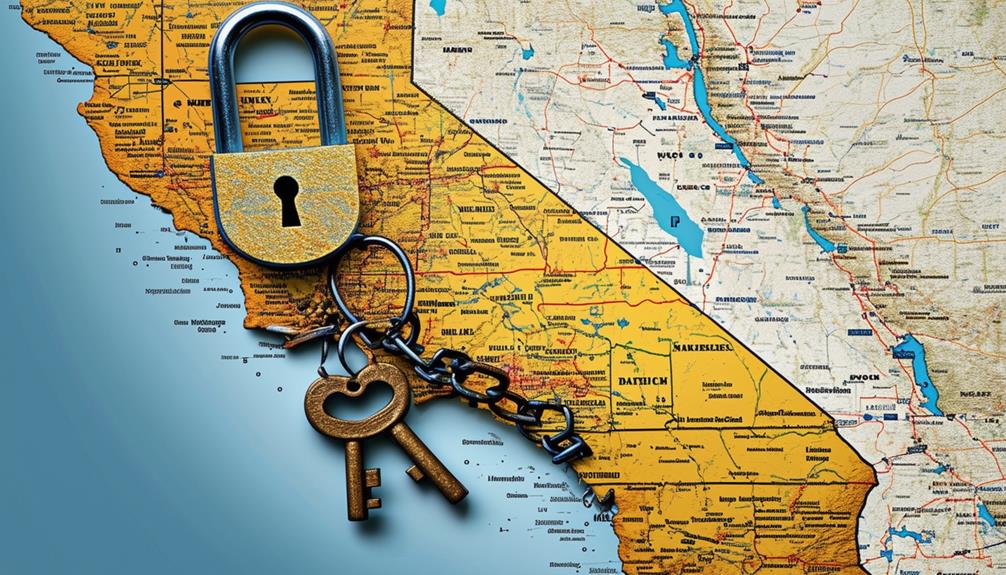
Let's talk about California's regulations on lock picking.
In this state, the legality of lockpicking is tightly regulated, and engaging in it without permission can lead to severe penalties.
According to lock picking regulations, it's essential for individuals to be aware of the specific laws governing this practice in their jurisdiction.
It's vital to understand these regulations to avoid any legal consequences related to lock picking in California.
California Lockpicking Legality
California lockpicking laws are clearly outlined in the state's regulations. In California, possessing lockpicking tools with the intent to commit burglary or theft is illegal under Penal Code 466. This law prohibits the possession of tools designed to pick locks, such as lockpicks, bump keys, and other devices, with the intent to use them for criminal purposes.
However, it's essential to recognize that owning lockpicking tools for lawful purposes, such as locksmithing, is generally permitted as long as there's no intent to use them for illegal activities.
Furthermore, California law also prohibits the possession of key codes or other information that could be used to create unauthorized keys for burglary or theft. This regulation aims to prevent individuals from possessing knowledge that could facilitate criminal activities involving locks and keys.
Consequently, individuals in California should be aware of these laws and verify that their possession and use of lockpicking tools are in compliance with the state regulations to avoid legal consequences.
Penalties for Lockpicking
In California, violating lockpicking laws can lead to severe penalties. The state considers lockpicking a serious offense due to its association with burglary and theft. Penalties for lockpicking in California can include fines, imprisonment, and a criminal record.
If caught picking a lock without proper authorization, you could face significant consequences. The penalties for lockpicking vary depending on the circumstances and the intent behind the act. In some cases, individuals caught attempting to pick a lock may receive a misdemeanor charge, resulting in fines of up to $1,000 and potentially six months in county jail.
For more serious offenses, such as using lockpicking tools during the commission of a crime, the penalties can escalate to felony charges. Felony charges can lead to imprisonment in state prison for several years, along with substantial fines.
Additionally, having a criminal record for lockpicking can have long-lasting consequences, impacting future employment opportunities and personal reputation.
To avoid facing these severe penalties, it's essential to understand and abide by California's lockpicking laws to guarantee compliance and avoid legal troubles.
Texas Lock Picking Statutes
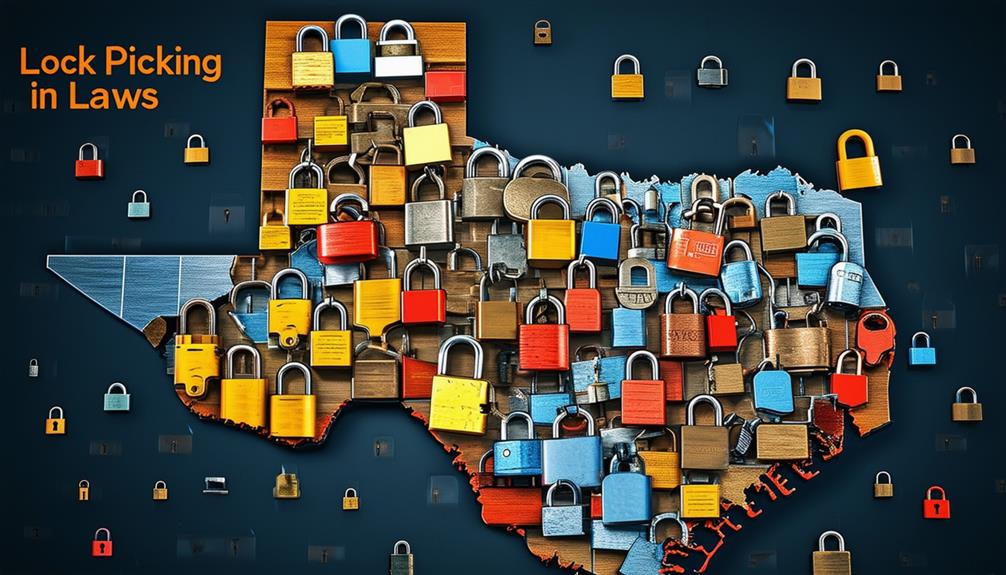
When it comes to lock picking laws in the state of Texas, understanding the statutes is important for anyone engaging in this practice.
In Texas, the laws surrounding lock picking are outlined to guarantee the safety and security of individuals and properties. It's important to be aware of the implications of these laws, as they can vary notably from state to state, and a thorough overview can provide valuable insights.
Here are some key points to keep in mind regarding Texas lock picking statutes:
- Legal Lock Picking: In Texas, it's legal to possess lock picking tools unless there's intent to use them for criminal purposes. It's essential to only use lock picking tools for lawful activities such as locksmithing or personal use.
- Unauthorized Entry: Using lock picking tools to gain unauthorized access to someone else's property without their consent is illegal in Texas. This includes breaking and entering into homes, vehicles, or any other secured spaces.
- Professional Regulations: Locksmiths in Texas are required to be licensed to confirm they're qualified to provide locksmith services. It's important to adhere to these regulations to operate legally within the state.
Understanding and following the Texas lock picking statutes is critical to avoid legal issues and guarantee ethical lock picking practices.
New York Lock Picking Laws

Now let's talk about New York's lock picking laws.
In NY, there are legal restrictions in place regarding the possession and use of lock picking tools, which are considered burglary tools under certain circumstances.
It's crucial to understand these navigating legal risks to avoid any potential penalties.
Violating these laws can result in penalties that vary depending on the circumstances.
Legal Restrictions in NY
Rarely do individuals consider the legal implications of lock picking in New York, but it's vital to comprehend the restrictions in place.
When it comes to lock picking restrictions in NY, here are some key points to keep in mind:
- Legal Use: Lock picking tools can be legally owned and used in New York if you're a locksmith, law enforcement personnel, or have explicit permission from the property owner.
- Intent Matters: The legality of lock picking often hinges on intent. If you're found with lock picking tools and can't provide a valid reason for possessing them, you may face legal consequences.
- Professional Locksmiths: If you're a professional locksmith, you're generally permitted to possess and use lock picking tools as part of your trade.
However, it's imperative to guarantee you're operating within the boundaries of the law and have the necessary licenses.
Understanding these lock picking restrictions will help you navigate the laws in New York more effectively and avoid potential legal issues.
Penalties for Violations
Under New York lock picking laws, individuals who violate the legal restrictions surrounding the possession and use of lock picking tools may face severe penalties.
Penalties for lock picking violations in New York can vary depending on the circumstances of the offense. Possessing lock picking tools with the intent to use them unlawfully is considered a criminal offense in the state. If caught with lock picking tools for illegal purposes, you could face misdemeanor charges, resulting in fines and potential jail time.
Repeat offenders or those involved in more serious crimes using lock picking tools may face felony charges, leading to harsher penalties, including longer prison sentences.
In addition to criminal consequences, individuals convicted of lock picking violations in New York may also face civil penalties. These penalties could involve paying restitution to any victims affected by the illegal use of lock picking tools.
It's essential to understand and abide by New York's lock picking laws to avoid facing these severe penalties and legal consequences.
Florida Lock Picking Restrictions

If you're interested in lock picking within the state of Florida, it's essential to be aware of the legal restrictions in place regarding this practice.
In Florida, lock picking falls under specific regulations to maintain security and prevent unlawful activities related to this skill. Understanding the legal aspects of lock picking is vital for hobbyists to guarantee compliance with state laws.
Here are some key points to take into account:
- Possession of Lock Picking Tools: Florida statutes prohibit the possession of lock-picking tools with the intent to commit any criminal offense.
- Lock Picking for Unauthorized Entry: Using lock-picking techniques to gain unauthorized access to property, vehicles, or any secured premises is illegal in Florida.
- Exceptions for Legitimate Purposes: While the laws are stringent, there are exceptions for locksmiths, law enforcement personnel, and individuals with valid reasons for possessing lock-picking tools.
It's vital to guarantee that you have a lawful purpose for engaging in lock-picking activities to avoid legal repercussions in Florida.
Understanding these Florida lock picking restrictions is vital for individuals practicing this skill within the state boundaries.
Illinois Lock Picking Requirements
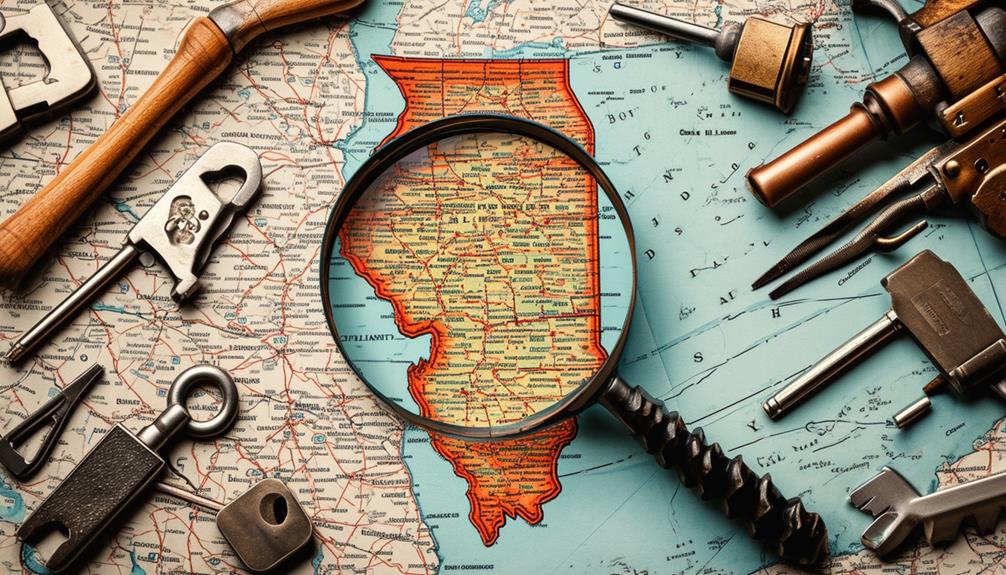
Steering through the domain of lock picking in Illinois entails adherence to specific regulations set forth by state laws.
In Illinois, lock picking tools are legal to possess, sell, and use, as long as there's no intent to use them for unlawful purposes. Practicing safe techniques is critical for both hobbyists and professionals.
However, it's important to note that using lock picking tools on someone else's property without authorization is illegal and considered a criminal offense under Illinois law. This means that lock picking should only be done on locks that you own or have explicit permission to manipulate.
Furthermore, individuals engaging in lock picking activities in Illinois should exercise caution to avoid any unintended consequences.
It's necessary to always stay informed about the current laws and regulations regarding lock picking to guarantee compliance and prevent any legal issues.
Frequently Asked Questions
Can I Legally Own Lock Picking Tools in States With Restrictions?
Yes, you can legally own lock picking tools in states with restrictions, but it's essential to be aware of the specific laws in your state.
Understanding the regulations around lock picking tools will help you stay compliant and avoid any legal issues.
Always research the rules in your area and guarantee you use these tools responsibly and ethically to avoid any potential legal consequences.
Are There Specific Penalties for Using Lock Picking Tools Unlawfully?
If you use lock picking tools unlawfully, you could face specific penalties depending on your state's laws.
Penalties may include fines, jail time, or both.
It's important to understand and follow the laws in your area to avoid legal consequences.
Do States Have Different Definitions of What Constitutes Lock Picking?
Do states have different definitions of what constitutes lock picking?
Yes, states vary in their definitions, which can impact legality.
It's crucial to understand the specific laws in your state to avoid unintended consequences.
Checking the statutes and seeking legal advice can clarify any uncertainties.
Stay informed to guarantee compliance with local regulations and prevent legal issues related to lock picking activities.
Are There Any Exceptions for Locksmiths or Law Enforcement Officers?
Yes, there are exceptions for locksmiths and law enforcement officers.
In many states, these professionals are permitted to possess lock picking tools for legitimate purposes such as helping people who are locked out of their homes or vehicles, or for investigative work.
It's important for locksmiths and law enforcement officers to abide by all relevant regulations and laws to guarantee they're using lock picking tools responsibly and within the confines of the law.
How Do States Enforce Lock Picking Laws Outside of Criminal Activities?
When states enforce lock picking laws, they often rely on strict penalties and thorough monitoring.
Authorities employ advanced surveillance techniques, conduct regular inspections, and engage in undercover operations.
They leave no stone unturned, using cutting-edge technology and well-trained personnel to catch violators.
The consequences for breaking these laws are severe, deterring most individuals from attempting any unauthorized lock picking activities.
Conclusion
So, there you have it. Lock picking laws vary from state to state, so make sure to check your local regulations before you start practicing your skills. Remember, it's always better to stay on the right side of the law, even if you're just trying to hone your craft. Keep calm and pick on, but always remember to lock it up when you're done.

